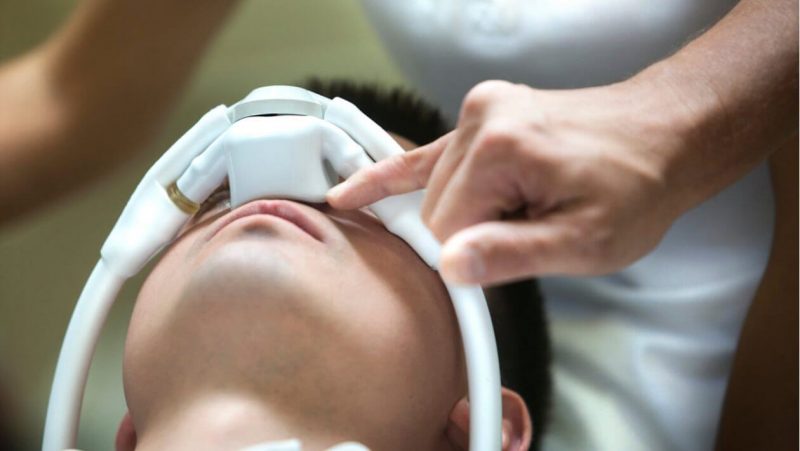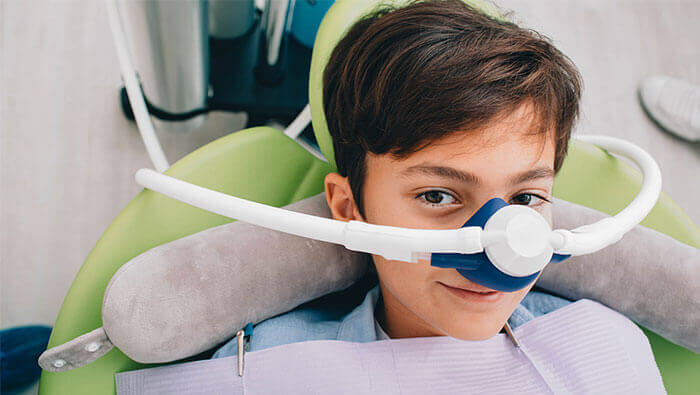For many people, a standard trip to the dentist is a simple procedure. However, for others, the idea of sitting in a dental chair makes their pulse race and their hair stand on end, triggering massive anxiety. In addition, some trips to the dentist aren’t always routine and require some sort of sedation to minimize pain. In many cases of patient anxiety or specific treatments, your dentist may recommend laughing gas. But what is laughing gas? What are its effects? How long does laughing gas last after surgery or treatment?
Key Takeaways
- Laughing gas, or nitrous oxide, is a sedative used in dental practices to reduce anxiety and pain.
- Effects of laughing gas are immediate and wear off within minutes after dental work is completed.
- Laughing gas is beneficial for those with anxiety, fear of needles, inability to sit still, sensitive oral nerves, or small mouth.
- Side effects of laughing gas can include nausea, vomiting, sleepiness, sweating, and headaches.
- Contraindications for laughing gas include COPD, Bleomycin medication, conditions with air spaces in the body, low vitamin B12/folate levels, and pulmonary hypertension.

What is laughing gas?
Nitrous oxide, better known as laughing gas, is an effective sedative often used in dental practices. When your dental professional administers laughing gas, a small mask is placed on your face, and you inhale a mixture of nitrous oxide and oxygen. As you breathe in this mixture, you will experience a reduction in anxiety, feeling a calmness come over your body. You may also experience a feeling of euphoria and a reduction in pain. But, contrary to the name, you will not double over in laughter.
While it is a sedative, it will not completely put you under like some other treatment options. Laughing gas leaves you feeling calm, but you are still awake and able to respond to your dentist, such as when they ask you to open wider or tilt your head. While breathing in the gas, you may experience a tingling or heaviness in your arms and legs, but this is normal and contributes to the relaxing state it hopes to achieve.
Laughing gas begins to work almost immediately and continues to work while you breathe it in. Once your dentist completes the necessary dental work, they will remove the mask, and you will return to breathing room air or oxygen. Within a few minutes, the effects of the laughing gas subside, and you return to your normal state. Unlike other forms of sedation, it has no long-term effects and you can typically drive yourself home after your procedure.
When do you need laughing gas?
Those that suffer from anxiety and fear when it comes to the dentist often put dental work off, leading to the need for more complicated treatments or tooth loss. Sedation dentistry and the use of nitrous oxide helps these patients receive the treatment they need. In addition to helping those with anxiety, the use of laughing gas is beneficial on many other occasions, including:
- Fear of needles – Needles are often used in the dental chair to administer numbing or pain-relieving medication. For those with needle phobia, nitrous oxide can help relax them and make it easier for these medications to be administered.
- Inability to sit still – This is often the case in children but can happen in adults as well. If you get antsy sitting in the dental chair and cannot sit still, it will help relax you and allow your dentist to treat your dental concerns.
- Sensitive oral nerves – If you suffer from overly sensitive oral nerves, it can help reduce the pain you may experience with dental work.
- Small mouth – If you have a small mouth, dental work can often make your mouth and jaw very sore. Laughing gas helps to relax your oral muscles and make dental work less painful to perform.
Nitrous oxide side effects
While most people do not experience any negative side effects when using laughing gas, there are possible. Most of these side effects occur when the nitrous oxide level is too high, or a change in the percentage suddenly occurs during administration. These side effects can include:
- Nausea
- Vomiting
- Increased sleepiness
- Excessive sweating
- Shivering or chills
After the administration of laughing gas, you should receive oxygen for at least five minutes. This is designed to flush the nitrous oxide from the lungs. If oxygen is not administered, some people may also experience headaches.
Contraindications of using nitrous oxide
Laughing gas is a safe and effective sedative for most people. However, if you suffer from some conditions or are taking specific medications, nitrous oxide is not recommended. These conditions include:
- Chronic Obstructive Pulmonary Disease (COPD) – In patients with COPD, the complication comes from the oxygen that is mixed with nitrous oxide. Increased levels of oxygen can decrease the drive to breathe in patients with COPD.
- The medication Bleomycin – Similar to COPD, this contraindication involves the oxygen administered with laughing gas. Higher than normal concentrations of oxygen can induce a lung injury in people taking this anti-cancer medication or having a history of taking it.
- Conditions that create air space in the body – This can include a previous history of middle ear surgery, pneumothorax, bowel obstruction, or the presence of alveolar bullae. Nitrous oxide can expand in these air spaces and can contribute to blindness, deafness, bowel distension, and more.
- Vitamin B12 and folate levels – Those with depleted levels of vitamin B12 and folate and those in their first trimester of pregnancy should avoid nitrous oxide. Laughing gas can further deplete these vitamins in the body and contribute to megaloblastic anemia or neurologic deterioration.
- Pulmonary hypertension – Nitrous oxide can constrict pulmonary vascular smooth muscle, worsening pulmonary hypertension.
Learn if laughing gas is right for you
Being afraid of sitting in a dental chair or trying to avoid the pain associated with dental treatments should never stop you from seeking dental care. Regular care helps prevent severe dental concerns and tooth loss and laughing gas can help make regular dental care easier. If you would like more information on how laughing gas and sedation dentistry can help you have a healthy and beautiful smile, contact Soundview Family Dental online or call us today at (425) 563-6360.


